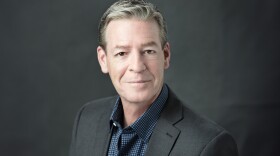After thinking about starting a record label for more than 10 years, Bobby Franks — a bartender at Downtown Cocktail Room who played in local punk bands in the ’90s — finally did it last year. Through Running in Place Records, his DIY label, he plans to preserve the eclectic sound of Vegas’ punk community — on vinyl.
“I want to help people I like, and music I like, get exposure, or just have something like a documentation,” Franks says. “In 20 years, this is like, ‘Check this out. This came out of Las Vegas in 2018.’”
His label has released four seven-inch records from four local artists across the punk-rock spectrum, including aggressive, in-your-face hardcore acts Oversight and recently disbanded Moonblood, atmospheric post-punk outfit Dark Black, and lo-fi songwriter Brett Vee. Now Franks is looking into the possibility of releasing either a split record or a compilation cassette of local artists.
Desert Companion spoke to Franks about what it’s like curating a DIY record label against the backdrop of an entertainment industry often overshadowed by the glitz of the Strip — and in a world where digital music is king.
How did Running in Place Records come to fruition?
I’ve been somewhat involved in the local music scene since around ’94 or ’95. I used to do fanzines. The last fanzine I published was called Running in Place. I just liked the name. It felt like a cool name to continue doing into a record label, and it was always something that was in the back of my mind.
I had a few false starts. Like 2007-2008, I tried starting a record label, but I just didn’t have the money for it. Fast-forward 11 years, I was in a position where I could do it.
What’s the mission of Running in Place?
I might go see a band that’s out on tour, but at the same time my eyes are opened up to all of this new stuff that I didn’t go there for. That’s kind of the concept of the label. It’s all stuff that I’ve heard from a friend, or live. The live experiences are what really get me. So I always base what I do off of bands’ live performances. The focus is obviously, like, punk and hardcore, and weird underground stuff that isn’t really going to be highlighted — especially in a place like Vegas, where everything’s big billboards, established DJs, and rock bands. My focus is house parties, garage shows, underground venues.
What’s appealing about putting music out on vinyl, especially in the form of seven-inch records?
Vinyl is forever. You’re actually looking at something as a piece of art as opposed to something on your phone that you’re just clicking on. The format of a seven-inch record is really cool. You have maybe eight minutes maximum, four minutes per side. It’s a great representation of that band. I just like the concept of hearing something without hearing too much of it, and then wanting to hear more. Plus, pricing. Vinyl’s kind of expensive. Doing a full LP for a band is, like, dedication. An album would take a year in planning, and three times as much as money.
What’s the process like for releasing a record?
I do everything. The business model is kind of the way a lot of my favorite punk rock labels started. I’m paying for the pressing. I’m also trying to get distribution, which is still kind of a hassle. The band supplies the recording, and I pay for the final mastering of that recording. They have the creative control. I’m just into it so much that I want to put it out in the physical form. I don’t own the recording. There are no contracts. I’m pretty much curating a record label as opposed to running it like a business. The concept was never, “I’m going to become rich.” My girlfriend convinced me to make shirts that I could sell to make more money to make more records, but I didn’t even want to do that at first.
Genre aside, what do you look for in bands for your label?
Ethos. There’s a fine line between style of music and message. No misogyny, no sexism, racism, homophobia. I’m not going to put out something amazing just for the sake of it being amazing. Like, there has to be good politics behind those individuals. The mentality of the crowd — that all has something to do with if I’m going to put out this band’s records. That’s important to me.
How do you think the dynamics of Running in Place would be if you were in another city with a longer-established DIY punk and vinyl culture, such as Los Angeles, Seattle, or Portland?
It’d probably be a little smoother, but I still would have the same operating strategy. I’d probably sell more copies.
I love Las Vegas. I moved here in 1994, when I was 14, and I’ve never wanted to live anywhere else. I grew up in Los Angeles, so it wasn’t like I came from the middle of nowhere. I like the smallness of Vegas. There are pockets of Las Vegas that seem very real and honest, but we’re in a city that’s surrounded by all this fake, so I like living here because of that. It’s a big façade, a lot of it’s bullshit. But underneath it all there’s a lot of really cool stuff that I wish more people were into, and that’s the whole point of doing what I’m doing.
For more, go to runninginplacerecords.com, or visit 11th Street Records, Record City, or Vegas Vinyl.









